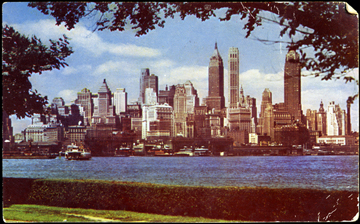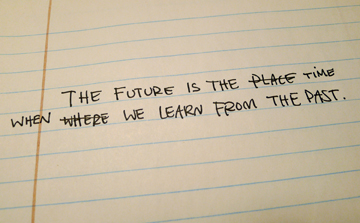The Romantic subject, who emerged roughly two hundred years ago as the prototype of the modern subject, who looks at a beautiful vista to see not the landscape but “an earlier instantiation of the self.”
— Ulrich Baer
[youtube:https://www.youtube.com/watch?v=voMDL1TgTh4]
Products barely years old already bear the time-stamp of progress. Which is a more convoluted way of saying technology is rapidly changing, outmoding the inefficient and making useful objects historical artifacts before their time. Hardly a luddite, I love computers, gaming devices, streaming cinema, as well as cell phones and the multitude of new ways our time here is being recorded and distributed. It is the rapid romanticization of the obsolete I find so confounding.
I received my photographic education at an awkward technological moment, resulting in an acquisition and practice of techniques already expired. About a year ago, I was showing a friend and fellow photographer an image I had made and was rather proud of. “So beautiful,” she marveled as I puffed with pride. She continued, “Look at that grain! Film is just so beautiful, isn’t it?” Taken aback by her focus on format rather than content, I didn’t know how to respond.

Nostalgia is a comparative act and photographs have, for almost two centuries, remained its quintessential agents. Images enable us to look upon what has been or is being represented and immediately create a space for comparison. In between a fiction and a truth — the present moment and the one depicted. They are not simple either/or distinctions. The comparisons brought on by nostalgia are more exaggerated and complex manifesting in an ongoing state of distorted reality. “Unlike melancholia, which confines itself to the places of individual consciousness, nostalgia is about the relationship between individual biography and the biography of groups or nations, between personal and collective memory,” writes Svetlana Boym.
New York, a city that engenders nostalgia even in those who have never visited. I know this for a fact, because I was one of those people for many years. Now as a resident, it is difficult not to continue to long for times already past, living amid the artists whose lives and work created the cinematic myths of more exciting eras. In the preface to his 1991 New York chronicle, Low Life, Luc Sante impeccably articulates this delightfully torturous paradigm. His analysis maintains an uncanny resonance to the generation currently perpetuating and profiting from the time he published:
The common word for this kind of distortion is “nostalgia.” This word can be generally defined as a state of inarticulate contempt for the present and fear of the future, in concert with a yearning for order, constancy, safety, and community—qualities that were last enjoyed in childhood and are retroactively imagined as gracing the whole of the time before one’s birth. Recently it has become a category of trade, under which are marketed the knickknacks and ephemera of past decades; in this function it encompasses connoisseurship, fetishism, fashion cycles, and social history, and makes them all equally base coin. Nostalgia also has another function, however.
…Past decades come into vogue at regular intervals, at the point at which people who experienced those decades as children and adolescents attain positions of power in the world. In their years of struggle they primarily looked to the future; having both achieved their goals and failed to realize their fondest wishes, they have the rue and the leisure, the complacency and dissatisfaction to look backward, and the means to broadcast an idealized version of the remembered past, from which, however, the grime of history cannot entirely be washed. Then the tales, the legends, the styles and prejudices and assumptions of those decades are transmitted to younger generations, and these pass along the lore in further fragmented form to their successors. The telephone-game relay of progressive distortion present in this transmission closely resembles the entropic tendency of oral tradition. (xi –xii)
Psychic distortion. Oral tradition. Digital mediation. I wish Hollis Frampton was still alive, I have so many questions regarding his (nostalgia).





